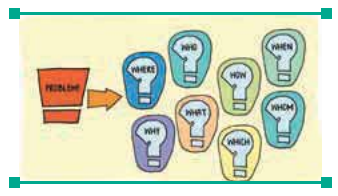Definition, Factors affecting, Steps, Tips - Problem Solving | 11th Home Science : Chapter 9 : Personality Development and Life Coping Skills
Chapter: 11th Home Science : Chapter 9 : Personality Development and Life Coping Skills
Problem Solving
PROBLEM SOLVING
Definition
Problem Solving is the term used for thinking
or thought processes that is specifically aimed at finding Solutions to
specific problems. This process contin-ues on spectrum from conceiving an idea
through accomplishing goal by means a set of mental operations.

Factors affecting problem solving
·
Poor Intelligence
·
Absence of sufficient concepts
·
Wrong thought habits
·
Limited vocabulary
·
Prejudices
·
Lack of awareness
“The only way to solve a problem is to change the thinking that created it.” Albert Einstein (1879–1955)
Steps in Problem Solving
The steps in problem solving are
as follows
Awareness of the problem–An individ-ual has to
be aware of the problem. If he senses that there is a problem he will know the
way to solve it.
Example: What will happen to a boy who is absent continuously?
1. Recognition of the problem– The in-dividual has
to understand the prob-lem by comparing his past experiences faced with present
situation.
Example: All the students want to know what has happened to their favourite monitor
2. Collection of data – Collection of data plays an important part in solving the problems. Data regarding
the problem is collected
Example: One of the boy who lives nearby is spotted and asked to go to the monitor house. He finds out that his monitor is suffering from malarial fever.
3. Formulation of
hypothesis - Hypothesis means “idea or suggestion put forward as a starting
point for reasoning or explanation”. Hence a hypothesis may be right or wrong,
accepted or rejected after its validity is verified completely.
Example:
One may ask why the monitor alone was attacked by malarial fever. The boys try
to formulate tentative guesses to the question. Perhaps the monitor visited
someone who had malarial fever. Perhaps monitor slept without mosquito net at
night, or water stagnation near his house.
4. Evaluation or testing of
hypothesis: Hypothesis formulated is tested.
when monitor comes back to school after recovery from malarial fever he says that there is a big pond near his house where water stagnates and breeds mosquitoes. He also tells them that one night he did not use mosquito net because it was a very hot night.
5. Making of Generalisation –Finding a general
principle to a particular situa-tion is called generalization.
i)
One should not sleep without a mosquito net at night in swampy areas.
ii)
One should maintain good habits so that he/she may not be attacked by a
disease.
Five “I”- approaches to Daily
Problem Solving
1. Intention - State the goal of
the prob-lem to be solved
2. Interest - What is the problem
where do you see the problem in the process
3. Investigate - What is the root
cause?
4. Intervene - Limit the effect of
the problem
5. Implement - Permanently prevent
the problem from reoccurring.
Tips to increase our Problem Solving Skills
·
Dance
·
Workout our brain with logic puzzles
·
Get good night sleep
·
Work out to some tunes
·
Participate in yoga
Related Topics